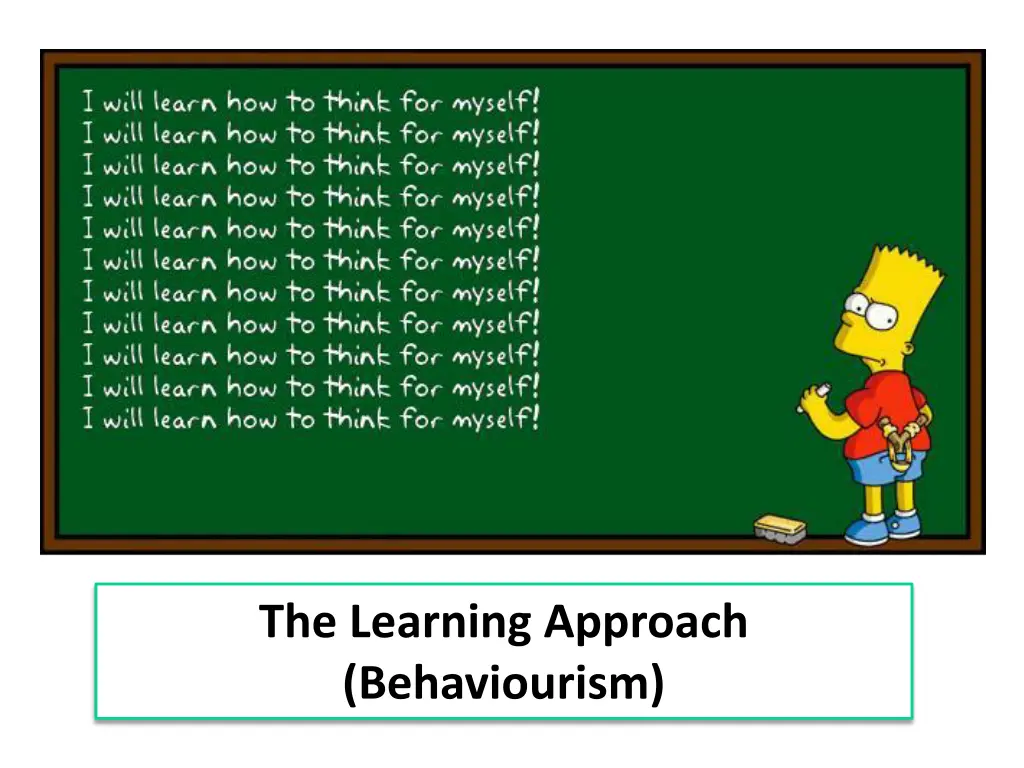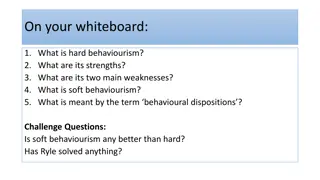
Understanding Behaviorism: Classical and Operant Conditioning Explained
Dive into the world of behaviorism with a focus on classical and operant conditioning. Learn how behaviors are learned through associations and consequences, and explore real-life applications. Discover the difference between classical and operant conditioning, and how they influence behavior in various scenarios.
Download Presentation

Please find below an Image/Link to download the presentation.
The content on the website is provided AS IS for your information and personal use only. It may not be sold, licensed, or shared on other websites without obtaining consent from the author. If you encounter any issues during the download, it is possible that the publisher has removed the file from their server.
You are allowed to download the files provided on this website for personal or commercial use, subject to the condition that they are used lawfully. All files are the property of their respective owners.
The content on the website is provided AS IS for your information and personal use only. It may not be sold, licensed, or shared on other websites without obtaining consent from the author.
E N D
Presentation Transcript
The Learning Approach (Behaviourism)
Objectives Objectives To outline the difference between operant and classical conditioning To apply the theory to a real life situation
The Behavioural Approach The Behavioural Approach All behaviour is LEARNT/LEARNED List 5 things that you have learnt how to do in your life.
What is conditioning? What is conditioning?
Classical Conditioning Classical Conditioning - Learning through association - First proposed by Pavlov, who got dogs to salivate to the sound of a bell. - The dogs learnt to associate the bell with their food and would salivate when the bell rang as they expected food to come. association https://www.youtube.com/watch?v=hhqumfp xuzI
Classical Conditioning Classical Conditioning US UR (Food Saliva) CS + US UR (Bell + Food Saliva) CS CR (Bell Saliva)
Classical Conditioning Classical Conditioning An unconditioned stimulus will produce an unconditioned response (US UR) A conditioned stimulus is paired with the unconditioned stimulus and this produces the unconditioned response (CS + US UR) Eventually the conditioned stimulus alone will produce the desired response, which is now called the conditioned response (CS CR)
Classical Conditioning Classical Conditioning Explain how a child could develop a phobia through Classical Conditioning US UR CS + US UR CS CR
Operant Conditioning Operant Conditioning Other way to learn behaviours Learning through the consequences behaviour. consequences of Positive/negative reinforcement
Operant Conditioning Operant Conditioning B. F. Skinner rats/pigeons in boxes. Behaviour can be learnt through a series of rewards or punishments E.g. Skinner taught pigeons to play ping pong... https://www.youtube.com/watch?v=tWtvrPTb Q_c https://www.youtube.com/watch?v=Mt4N9GS BoMI
Operant Conditioning Operant Conditioning Positive reinforcement Adding something to the environment to encourage desired behaviour Negative reinforcement Taking something away from the environment to encourage desired behaviour Punishment
Computer games Computer games Positive Reinforcement? Negative Reinforcement? How can conditioning explain the urge to shoot Zombies in a game? Punishment? How could you explain video game addiction with behaviourist principles? Use the text book to support you?
Operant Conditioning Operant Conditioning Can you think of a way a person might learn abnormal behaviour through operant conditioning? Anorexia OCD Schizophrenia Anxiety disorders Depression
Behaviourism in practice... Behaviourism in practice... Dear Yr12, For as long as I can remember I have been afraid of spiders. I can t be in the same room as a spider and get in quite a state if I see one. I have noticed my daughter has begun to react in a similar way to spiders, she is screaming and crying when she sees one. Why does she copy my behaviour? Please explain Susan
Behaviourism in practice... Behaviourism in practice... Dear Yr12, I am having some problems with my son. He has been banging his head on the floor when he gets stressed. Can you suggest a way I could help him to stop? Many Thanks Patrick
Objectives Objectives To outline the difference between operant and classical conditioning To understand how abnormal behaviour can be learnt To apply the theory to a real life situation


